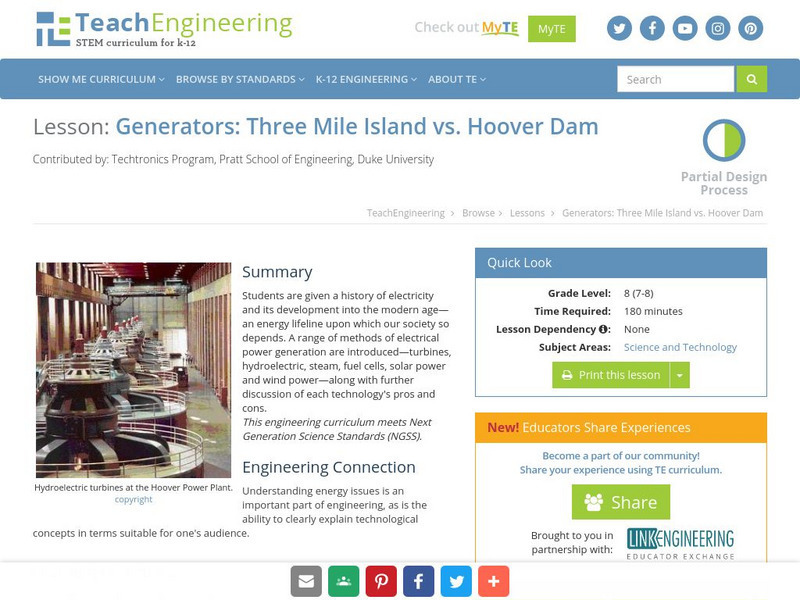Other
Texas Comptroller of Public Accounts: The Energy Report: Coal [Pdf]
Chapter 7 of a report on the energy industry in Texas. It looks at coal, its history, its uses, its economic impact in Texas, consumption, mining, and the transportation of coal. The process of generating electricity from coal is...
Other
Cape Breton Miners' Museum: History of Mining
The first coal mine was opened in Cape Breton in 1720. Read about the long history of coal mining there, mining techniques, how coal is formed, the industry's impact on immigration, coal miners' unionization, etc. There is a detailed...
Nature Conservancy
The Nature Conservancy: Renewable Energy
In this lesson, students explore solar and wind power-two important renewable energy sources.
Other
U.s. Mine Safety and Health Adm: Mine Safety and Health Administration
As a regulatory agency, the Mine Safety and Health Administration (MSHA) provides safety information to coal miners.
TeachEngineering
Teach Engineering: Generators: Three Mile Island vs. Hoover Dam
Students are given a history of electricity and its development into the modern age lifeline upon which we so depend. The methods of power generation are introduced, and further discussion of each technology's pros and cons follows.
Annenberg Foundation
Annenberg Learner: The Habitable Planet: Energy Challenges
With this resource, users join investigators in the exploration of humans' use of and dependence on the many energy resources. Learn about new technologies such as carbon capture and sequestration as an alternative to reduce our carbon...
US Energy Information Administration
U.s. Eia Energy Kids: Coal
Easy-to-understand information on mining and transporting coal, producing it, uses of coal, and coal and the environment.
Other
American Coal Foundation: The United States of Energy
Help learners learn about coal and its role in energy and electricity. The United States of Energy is a complete classroom program that allows students to learn about the many energy sources that power the United States and includes...
Other
American Coal Foundation:lesson Plan:how Much Does It Cost to Light the School?
Lesson explores where electricity comes from, how much it costs, and the amount of coal that is used. Learners will relate these concepts to how much coal is needed to light their school/classroom for one hour.
Other
American Coal Foundation: Lesson Plan: History of Coal in the u.s.
Students will learn about the history of coal mining in the United States by examining a timeline of key dates. In this two-part lesson, they will do research to discover why the coal industry is important to the economy and what types...
University of Kentucky
University of Kentucky: Rocks and Minerals: Sedimentary Rocks
An excellent resource for learning about sedimentary rocks and how they form. The different types of sedimentary rocks and deposits found in Kentucky are listed, with links to dedicated pages for each. Covers clay, shale, sandstone,...
Other
Geology.com: Rocks: Pictures of Sedimentary Rocks
Presents photographs of examples of clastic, chemical, and organic sedimentary rocks, with short descriptions underneath each rock image. Each rock name is also linked to its own dedicated page with a great deal of additional information...
Other
American Coal Foundation: Coal Energy Facts
Comprehensive overview of why coal is a major source of energy in the United States. Find out what coal is, what it is used for, how it is mined, where coal reserves are located, and how it is converted into electricity.
US Department of Energy
U.s. Department of Energy: Coal: Our Most Abundant Fuel
The U.S. has enough coal to last for the next 200-300 years. So why are we not using more of it? This article describes the different types or "ranks" of coal, the history, and the problems with burning coal for energy.
National Geographic
National Geographic: Encyclopedic Entry: Non Renewable Energy
A good primer on non-renewable energy sources. Covers the overall advantages and disadvantages, and discusses the different types and their pros and cons. Includes a slideshow with captions.
US Department of Energy
Doe: Fossil Energy: Education Start Page
Overview of the fossil energy industry (oil, gas, coal) with detailed descriptions of the processes and the work of the people employed in the industry.
Khan Academy
Khan Academy: The Industial Revolution
At one time, humans, fueled by the animals and plants they ate and the wood they burned, or aided by their domesticated animals, provided most of the energy in use. All life operated within the fairly immediate flow of energy from the...
Khan Academy
Khan Academy: Energy Through Time
The quest for energy has always been a balancing act. As humans have gained greater control over their environment, they've found abundant resources - and faced numerous challenges. This article traces the history of our quest for energy.
Energy4Me
Energy4me: Great Energy Debate
After learning about all the energy sources, students will be able to list and identify the economic and environmental advantages and disadvantages of them.
eSchool Today
E School Today: Non Renewable Energy
Learn what non-renewable energy is and the different types.
National Academies of Sciences, Engineering, and Medicine
The National Academies: Our Energy Sources: Fossil Fuels
An overview of fossil fuels used in the United States. Coal, oil and natural gas are listed with information about each energy source.
Pennsylvania Historical and Museum Comission
Explore Pa History: Mining Anthracite
Examine the economic and historical impact of anthracite mining in Pennsylvania's rich history. Included in this historical account are video, interactive, audio, and pictorial artifacts.
National Institute of Educational Technologies and Teacher Training (Spain)
Ministerio De Educacion: Agentes Geologicos Ii
This unit will discuss how external geological agents shape different parts of our earth. It contains 15 interactive activities.
Cynthia J. O'Hora
Mrs. O's House: Clean Coal Technology
There is a debate on the table discussing whether clean coal is a viable source of energy or not. Understand the opposing views and decide what side of the table you fall on. Extension resources and activities are provided.


![Texas Comptroller of Public Accounts: The Energy Report: Coal [Pdf] eBook Texas Comptroller of Public Accounts: The Energy Report: Coal [Pdf] eBook](https://d15y2dacu3jp90.cloudfront.net/images/attachment_defaults/resource/large/FPO-knovation.png)

















